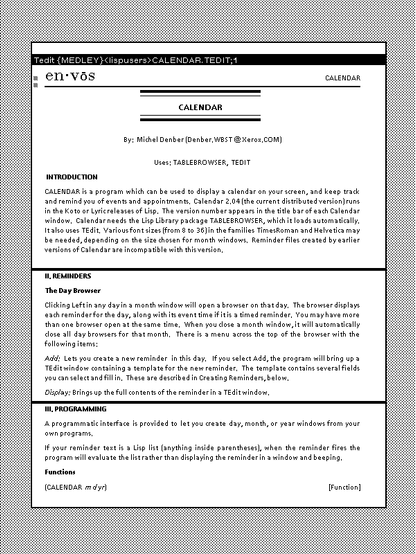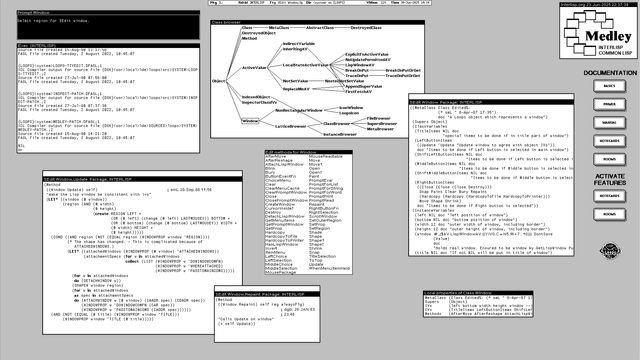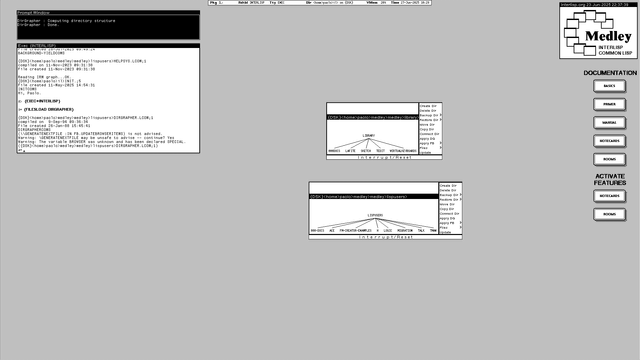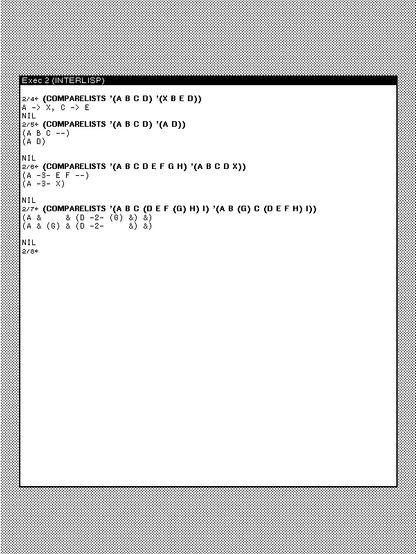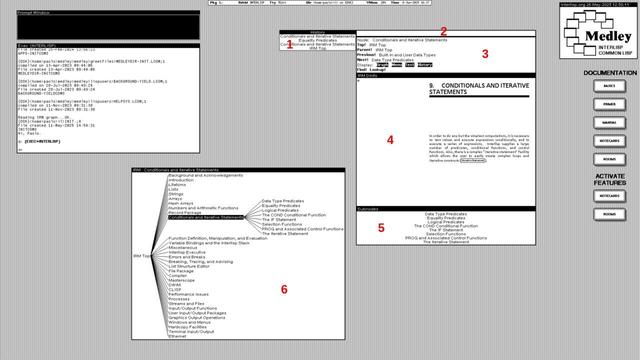The TEdit WYSIWYG editor of Medley Interlisp has a split window mode that shows different parts of a document. To split at the cursor or unsplit, middle-click on the title bar and select Split Window or Unsplit Window.
#InterLisp
I'm putting together a reading list on Xerox Network Systems (XNS), the network architecture developed at PARC and Xerox which influenced TCP/IP.
I'd like to learn more to play with the network functionality of Medley Interlisp based on XNS. Medley's TCP/IP stack is currently incomplete and not working.
https://ftpmirror.your.org/pub/misc/bitsavers/pdf/xerox/xns/XNSG058504_XNS_Introduction.pdf
A 1988 demonstration of the Cognoter collaborative brainstorming tool in Interlisp.
https://www.youtube.com/watch?v=KzBj13OSVzM
It was an application of project Colab at Xerox PARC to study how computers could support face-to-face-meetings. The researchers designed a conference room with specialized equipment such as a touch sensitive projection screen and collaboration software in Interlisp running on networked workstations.
About Colab:
In the Medley Interlisp documentation and literature the word "button" was used as a verb for mouse gestures for which we would now say "click". For example:
"Left-buttoning the display window updates it, and middle-buttoning the window brings up a menu that allows you to change the display state."
Someone should write some #MIT #CADR microcode and supporting code to make it possible to run #Interlisp / #Medley on the #MIT #LispMachine #LispM
Don't mind me, I'm just poking around this newfangled OOP thing with LOOPS on Medley Interlisp. LOOPS (Lisp Object-Oriented Programming System) is the object extension of Interlisp.
DIRGRAPHER is a Medley Interlisp tool that shows graphical directory trees and provides file management commands. It's part of the LispUsers collection of user contributed software.
🌖 Medley Interlisp 專案:重現歷史性軟體系統
➤ 復興歷史軟體,保存計算機科學的記憶
✤ https://interlisp.org/documentation/young-ccece2025.pdf
Medley Interlisp 專案旨在復原、保存並開發 Interlisp,這是 Interlisp 的最終版本。該專案目標是使其能在現代作業系統和硬體環境上運行,並加入現代功能,同時保留其作為開創性系統的歷史價值。本文描述了該專案過去五年來的運作、決策過程以及在將歷史軟體系統還原到現代計算環境中所遇到的獨特問題。專案的經驗將為其他類似的長期歷史軟體復原專案提供藍圖。
+ 這真是令人印象深刻的專案!能將如此古老的軟體系統帶回現代,不僅對歷史研究有幫助,也可能為現代軟體開發帶來啟發。
+ 我對 Interlisp 的「Do-What-I-Mean」系統很感興趣,這種自動修正錯誤的功能在當時非常先進,現在的 IDE 也有類似的功能,但似乎還沒有達到 Interlisp 的水平。
#軟體復原 #歷史計算機 #Interlisp
The Medley Interlisp Project: Reviving a Historical Software System [pdf]
https://interlisp.org/documentation/young-ccece2025.pdf
#HackerNews #TheMedleyInterlispProject #RevivingHistoricalSoftware #Interlisp #PDFSoftwareHistory
@interlisp ☝️ This is the untold story of the Medley Interlisp project, so to speak. The paper describes the unique issues and challenges faced in reviving the system over the first 5 years of the project, and what other software preservation groups can learn from this experience.
We are happy to share the preprint and slides of the paper "The Medley Interlisp Project: Reviving a Historical Software System" by Eleanor Young et al.:
https://interlisp.org/documentation/young-ccece2025.pdf
https://interlisp.org/documentation/young-ccece2025-slides.pdf
It tells the first 5 years of the Medley Interlisp Project and discusses what other historical software recovery groups can learn from our experience. The paper was presented at IEEE CCEECE 2025 in Vancouver and accepted for publication.
@jackdaniel @NGIZero h'mmm ... Yesterday, not for the first time, I was looking at reimplementing #InterLisp's GRAPHER library in #Clojure. It's doable, but surprisingly difficult. If there was a good Java SVG engine which allowed callbacks through JavaScript or whatever, it would be easier, and *possibly* Batik may do that.
But #CommonLisp in the browser, interacting with SVG in the browser... Now that sounds fun.
The LOOPS primer, published in 1987, captured well the essence of exploratory programming in Lisp:
The LOOPS interface provides both a programming tool and a thinking tool. As you develop a new system, each preliminary version provides an object for thought and discussion. The preliminary versions are a crucial part of the design process.
LOOPS (Lisp Object-Oriented Programming System) is the OOP extension of Interlisp.
Fugue, Interlisp-360, Lcom, XEOS.
These are some of the terms, names, and organizations in our Glossary. It's a useful resource for getting your way around Medley Interlisp. Any other terms you'd like to see defined?
@screwlisp One of the things which was most exciting to me in the #InterLisp D environment was the ease of producing dynamic, interactive graphs. I don't know any modern software environment which does it so well.
The newsletter Hotline was a support resource Xerox published in the late 1980s for users of Xerox Lisp (Interlisp and Common Lisp). It featured tutorials, usage tips, fixes, and more that are still valuable to Medley users.
The Interlisp function COMPARELISTS compares the structures of two lists and prints a terse description of the differences which highlights the items that differ. More details are in the Interlisp Reference Manual.
I submited to Forgejo (and hence Codeberg) a feature request to support Interlisp source files but it may be hard to implement. So I'm stuck with GitHub for Interlisp code.
In the mid 1980s Xerox published Masterscope, a newsletter for Interlisp-D users which featured product updates, project showcases, tips, and more. Browsing through the issues gives an idea of the applications and domains Interlisp-D was used for.
☝️ The 6 windows that make up the GUI of DInfo, the documentation browser of Medley Interlisp.
